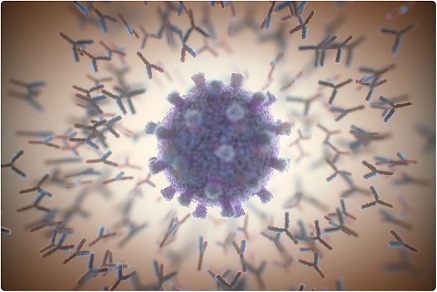BREAKING! Japanese Study Shows Convalescent And Vaccine Sera Has Little Or No Effect On Mu SARS-CoV-2 Variants. Might Be Upgraded To VOC Status Soon
Source: Mu or B.1.621 variant Sep 08, 2021 3 years, 6 months, 3 weeks, 5 days, 3 hours, 4 minutes ago
New alarming study findings by Japanese researchers from the University of Tokyo, Kyoto University, Chiba University and Tokai University have shown and confirmed that convalescent and vaccine sera has little or no effect on the fast globally spreading Mu SARS-CoV-2 variants.

The study findings were published on a preprint server and are currently being peer reviewed.
https://www.biorxiv.org/content/10.1101/2021.09.06.459005v1
The World Health Organization or WHO on August 30th, 2021, classified the SARS-CoV-2
Mu variant (B.1.621 lineage) as a new variant of interest (VOI).
The WHO defines “comparative assessment of virus characteristics and public health risks” as primary action in response to the emergence of new SARS-CoV-2 variants.
A VOI is not a variant of concern (VOC), which is a variant that has been proven to acquire one of those characteristics, making it more dangerous and so more consequential. However the Mu is being monitored closely to see if it should be re-designated as a VOC.
The fact that it is now fast spreading to many countries with increasing caseloads being detected, it is sending ‘warning alarms’ to many health experts and authorities.
After being detected in Colombia, Mu has since been reported in other South American countries, in Europe, USA, Japan and certain South-east Asian countries.
As of 29 August 2021, more than 4,500 sequences of Mu have been uploaded to the
GISAID platform from 39 countries. However in this short time, more sequences of the MU strain are being detected across the world.
On the same 29
th of August the WHO said its global prevalence has declined to below 0.1 percent among sequenced cases but that figure is fast rising in the last 10 days. In Colombia, it is now at 39 percent and is still rising.
The Japanese study team demonstrated that the Mu variant is highly resistant to sera from COVID-19 convalescents and BNT162b2 (Pfizer–BioNTech)-vaccinated individuals.
Detailed direct comparison of different SARS-CoV-2 spike proteins revealed that the Mu spike is more resistant to serum-mediated neutralization than all other currently recognized variants of interest (VOI) and concern (VOC). This includes the Beta variant (B.1.351) that has been suggested to represent the most resistant variant to convalescent and vaccinated sera to date.
https://www.nature.com/articles/s41586-021-03412-7
https://www.nature.com/articles/s41586-021-03398-2
In order to assess the sensitivity of the Mu variant to antibodies induced by SARS CoV-2 infection and vaccination, the study team generated pseudoviruses harboring the spike proteins of Mu or the other VOC/VOIs.
Alarmingly virus neutralization assays revealed that the Mu variant is 12.4-fold more resistant to sera of eight COVID-19 convalescents, who
were infected during the early pandemic (April–September, 2020), than the parental virus (P=0.0078). Also, the Mu variant was 7.6-fold more resistant to sera obtained from ten BNT162b2-vaccinated individuals compared to the parental virus (P=0.0020).
Indirectly these study findings show that in reality, the convalescent and vaccine sera has little or no effect on the Mu SARS-CoV-2 variants!
Resistance to COVID-19 convalescent and vaccine recipient sera can be attributed to a variety of mutations in the viral spike protein. The majority of Mu variants harbors the following eight mutations in spike: T95I, YY144-145TSN, R346K, E484K, N501Y, D614G, 57 P681H, and D950N. These include mutations commonly identified in VOCs: E484K (shared with Beta, Gamma), N501Y (shared with Alpha), P681H (shared with Alpha) and D950N (shared with Delta). Of those, the E484K change has been shown to reduce sensitivity towards antibodies induced by natural SARS-CoV-2 infection and vaccination.
Since breakthrough infection by newly emerging variants is a major concern during the current COVID-19 pandemic, the study team warns that that their study findings are of significant public health interest.
https://www.nejm.org/doi/full/10.1056/NEJMoa2109072
The study findings will help to better assess the risk posed by the Mu variant for vaccinated, previously infected and naïve populations.
The new study findings along with new developments of the spread of the Mu variant is expected to force the WHO to upgrade the status of the MU variant to that of a VOC in a matter of weeks.
At the moment experts are still not sure as to what variants may be the next dominant player in the coming fall/winter surge, whether it’s the Lambda, the Mu or the C.1.2 variant or something new. At the same time as the Delta is also continuing to spread rapidly and also bringing forth a variety of new sub-variants, a possible scenario is that the Delta variant could become the ancestor of the new emerging dominant variant. (It should be noted that to date, more than 130 Delta sub-variants with unique mutations have been identified and experts are busy classifying them.)
A more doomsday scenario is that we have new surges where many variants are at play at once and co-infections start becoming the next pandemic trend!
For more on the fun times ahead for the coming fall and winter, keep on logging to Thailand Medical News, the only site rooting for the virus.
